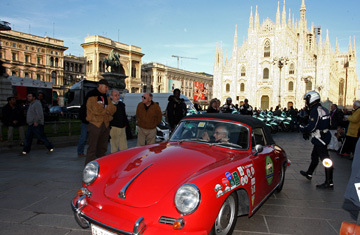
A Porsche arrives in Piazza del Duomo, Milan, to take part at the seventh revival of the Milan–San Remo Cup on March 13, 2009
A fast car is supposed to be a means of escape. In Italy, it's become one of the best ways to get caught. The land of Ferrari, Lamborghini and Maserati is getting tough on tax evaders, and police have taken to stopping drivers of high-end SUVs and luxury cars and forwarding their information to the tax authorities to make sure the income they've declared (and paid taxes on) matches their expenditures. "It's become invasive," says Alessandro Zaffarani, a Rome resident. While driving his wife's car — a BMW SUV — in December, he was pulled over twice in the course of half an hour. "They can stop you at any moment, not to ask you for the documents of the car, but for yours, as a person," he says.
According to Zaffarani, who runs a Chevrolet dealership in Rome, the scrutiny has also cut into business. Faced with a new tax on cars with powerful engines, a still stumbling economy and some of the highest gas prices in the world, buyers were already more reluctant to enter the lot. Now tax evaders don't want to risk getting caught either. And honest car buyers often don't want the hassle of additional attention. "At this moment, the market is paralyzed," says Zaffarani. In January, he suspended a promotion for the Chevy Camaro when demand dried up.
The skittishness of consumers has caused the value of used luxury cars to drop by some 15% nearly overnight, as the new car tax and police stops started to bite with the new year, says Sirio Tardella, director of a research center run by the Foreign Car Manufacturers' Association. "Many of these cars that can't find buyers in Italy are being exported to other markets where there's a more favorable situation," he says. For most of last year, used Porsches left Italy at a rate of about 40 a week, says Loris Casadei, director general of Porsche Italia. By December, the number had increased to 120 every week; in January, it reached 200. Casadei says he expects sales of new cars to take a hit as well. More than 18,000 high-end cars were sold in Italy last year, but he expects the industry will clear no more than 11,000 in 2012. "It's a bit myopic," he says. "Instead of incentivizing consumption in Italy. There's a disincentivization of consumption, which is exactly the opposite of what we need."
Is it worth it for the government? According to Giuseppe Ragusa, an economist at Rome's LUISS University, the challenge Italy faces in terms of taxes isn't one of a lack of revenue — the money collected in taxes currently makes up roughly 45% of the country's GDP, putting it in line with service-rich Scandinavian countries. "It's actually a problem of fairness, of who is going to pay these taxes," he says. Italy's underground economy is large, and the state coffers miss out in an estimated $160 billion a year in unpaid taxes. And so the tax burden falls on those who can't escape: usually big companies and their employees. "As a professor on a salary, I couldn't evade, even if I wanted to," says Ragusa. The result is a drag on the economy: higher taxes on most workers and a perception of unfairness that further encourages tax dodging.
Of course, the crackdown on luxury cars is mostly symbolic. And the roadside stops are just for show, as are similar measures like tax raids on ski resorts and controls on the owners of luxury yachts. Surely, a few tax evaders have been caught: many of those stopped driving Ferraris have been reported to have declared incomes of less than $39,500 a year. But with tens of thousands of luxury cars on the road, tax authorities have only scratched the surface. A more effective way of nabbing tax cheats will likely be new measures that track people's purchases to compare them with their income at the end of the year.
The real test of the police stops, however, will be whether they help stigmatize a practice that has been compared to a national sport. Italian Prime Minister Mario Monti has framed the discussion as a fight against people stealing from fellow citizens, and he's pledged that he will use any additional income collected to lower overall tax rates. "It's really changed public opinion," Domenico Minervini, commander of the tax police in the wealthy Emilia-Romagna region east of Milan, told reporters in February. "Evaders are starting to get really scared. Many citizens are beginning to get rid of [displays of wealth], probably because they've declared little or nothing until now."
The measure's success will depend largely on how buyers of Italian luxury cars ultimately respond. Will evaders continue to avoid the tax man by leasing cars from nearby Monaco or San Marino, where their acquisitions are less likely to be noticed by the Italian state? Or will they follow the lead of Beatrice Saottini, president of a Porsche dealership in northern Italy? Last month, she began offering her clients a sticker to go with their cars. Printed in the center of a bull's-eye in the colors of the Italian flag is the word "Passion." And arcing underneath it: "I pay my taxes."
